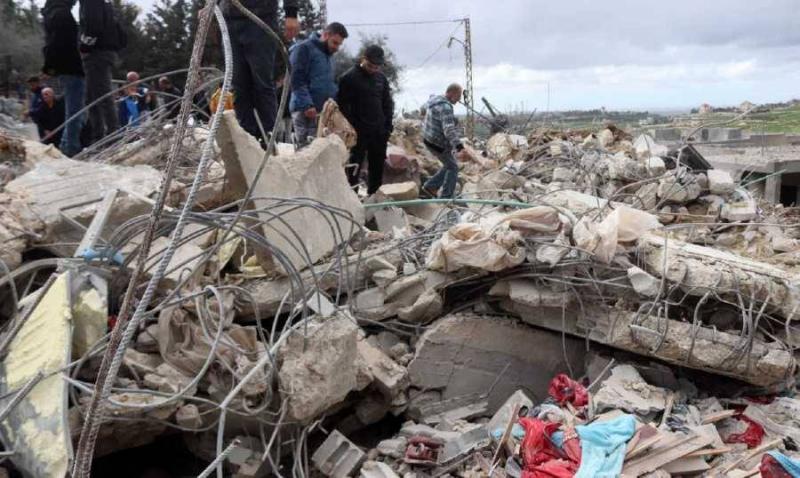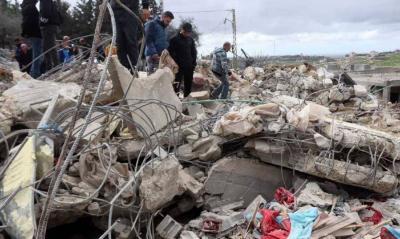Except for the official Cypriot visit to Lebanon, which is solely related to the issue of Syrian displacement, there are no expected visits from international officials in the near future to discuss the south or the presidential affairs and pending issues. What has become certain is that U.S. envoy Amos Hochstein will not return to Lebanon at present, given the ongoing escalation and the potential Iranian response to the strike on the consulate in Damascus, with attention turning to the southern front as a primary battlefield, especially with the deadlock in negotiations that have not yielded results in the past. The conditions for resuming talks are still linked to a ceasefire in Gaza, as reported by "An-Nahar."
At the same time, questions are being raised about whether the Quintet committee will continue its rounds after Eid al-Fitr, amidst skepticism about the possibility of resuming the French envoy Jean-Yves Le Drian's mission in Beirut. Although no rounds are expected shortly, Lebanon has received messages from various international entities, particularly from the French, warning against Hezbollah's involvement in any potential Iranian response for fear of widening the scope of confrontation, which would increase depletion and lead to catastrophic results for the entire country.
The international messages came before Hassan Nasrallah’s speech on Quds Day, wherein he confirmed that the Iranian response is inevitable, stating that "the folly committed by Benjamin Netanyahu at the Iranian consulate will open the door to relief and decisiveness in the battle." Nasrallah's words heighten fears of further entanglement for Lebanon coinciding with any Iranian retaliation against Israel. According to international perceptions, any escalation resulting from an Iranian response from the southern front or any other region, regardless of its magnitude, would place Lebanon at the heart of the confrontation, especially since Nasrallah raised the challenge by asserting that "the basic weapon has not yet been used," emphasizing that "this battle will lead us to historic victory," while Israel expands its war against the party.
Wherever the Iranian response may come from, Lebanon will be in the targeted zone, according to a monitoring diplomat. If Tehran responds directly to Israel, then Hezbollah is the only entity in contact with it. Even if the response is described as cataclysmic, Nasrallah has expressed readiness, confirming that "the fighters on the borders and the front line are prepared for any reaction." Regardless of what Iran decides, it is clear that Israel is expanding its military operations deep into Lebanon, aiming to return residents of the northern settlements to their homes. A diplomatic source relays that American circles have reported Israel informing Washington that if no resolution is reached within a month, it would escalate to intensive operations and strike further targets to rearrange the situation along the border and displace Hezbollah from the area.
However, a diplomatic solution has become unlikely amid recent developments and the escalation following the Israeli strike on the Iranian consulate in Damascus, within an atmosphere that increasingly sounds the drums of war. While Hezbollah intensifies its battle to support Gaza, the Lebanese depletion continues in the absence of any horizon for resuming international mediation for negotiations. A growing local and international conviction is emerging that the battle on the southern front will be prolonged, potentially escalating with the possible Iranian response. The interest of the Israeli war government led by Netanyahu lies in maintaining the state of conflict and continuing the war.
In this regard, a diplomatic source indicates that sources in American circles suggest that if Netanyahu fails to convince the U.S. administration regarding the battle for Rafah, he may compensate by broadening the scope of the battle against Hezbollah and Tehran through striking new targets in Syria, regardless of the Iranian response. This tense situation, open to all possibilities, revives the debate around linking the Lebanese front to the war on Gaza, and whether it is possible to reposition Lebanon by reconsidering Hezbollah's management of the battle, particularly since it is a party engaged in a battle that has regional calculations related to Iran. This was clearly affirmed by Nasrallah concerning his approach to the Iranian response and Lebanon's involvement.
This means that the war in support of Gaza does not stem from purely Lebanese calculations, as evidenced by Hezbollah's refusal to negotiate before a ceasefire in Gaza was achieved when the Americans, through their envoy Hochstein, proposed it. The international messages also indicated that there should be no expectation of war results on Gaza and that the southern front should be separated from the sector, as continuing the linkage would have catastrophic effects on the Lebanese situation overall.
Alongside the war on Gaza and confrontation in the south, Israel is focusing on striking Iranian targets and Hezbollah positions in Syria, aiming, according to the diplomatic source, to draw everyone into its battle. The source notes that the Golan front has become isolated from the unity of fronts, as the Syrian regime has made a decision akin to neutrality, even while Israeli planes violate Syrian airspace. This suggests that today’s confrontation is between Israel, Iran, and Hezbollah in Syria and Lebanon. Thus, any Iranian response from the Golan is deemed unlikely, governed by different equations, along with the field inability to confront as the Syrian regime is not prepared to open its front and lacks the means to do so, additionally, the international understandings ensured by the Russians prevent igniting the Golan front according to "An-Nahar."
Concerns grow that Lebanon may become the site of a potential Iranian response, raising numerous questions, such as: Does the Islamic Republic decide to change its strategy by widening the scope of war? If the potential front is Lebanon, will it push Hezbollah to risk igniting it amid Israeli preparations for a large-scale war aimed at pushing the party away from the border region? Most importantly, Iran understands that the U.S. would support Israel in any regional war. The Gaza battle serves as a witness, as the United States continues to supply Israel with weapons and ammunition despite disagreements. If war expands between Israel and Hezbollah, Washington will not remain neutral but will support Israel, which seeks to draw everyone into the conflict through large and directed strikes and continuous pressure, aiming to drag the United States into a regional confrontation it doesn't want but would have to support Tel Aviv if it erupted.
The danger remains for Lebanon from the outbreak of a large war, and the current equation makes it the weakest amid the division crippling its components. As developments unfold, whether a major or limited Iranian response occurs, the southern front remains ablaze, while the confrontation between Hezbollah and Israel takes various forms of escalation and breaches of engagement rules, indicating the possibility of its expansion, either for Israel to achieve objectives it claims are essential for reassuring its northern settlers by eliminating their threats or for Hezbollah to assert that its battle is to protect Lebanon and continue supporting Gaza. Ultimately, the results will be catastrophic for the country.




